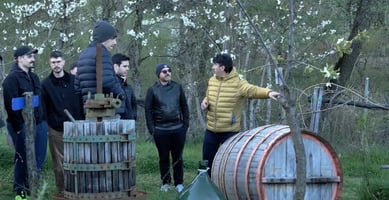How a sailing retreat strengthened collaboration and workplace culture

In today's hybrid work environment, creating authentic team connections has become more challenging than ever. One forward-thinking company discovered that the answer lay not in another Zoom call, but on the tranquil waters of Lake Iseo, where sailing and strategic planning combined to transform their workplace dynamics.
Their Monte Isola offsite retreat demonstrates how thoughtfully designed experiences can rebuild team cohesion while addressing the unique challenges of post-pandemic collaboration. We talked about it with Ylenia, the manager who organized this event for her team.
Rebuilding connections in a post-pandemic world
The primary objective was clear: strengthen team unity and stimulate collaboration in an informal, relaxed environment. But beneath this goal lay a deeper challenge facing many modern organizations.
"Post-pandemic, it's important to rebuild cohesion within teams and promote a positive environment that values office life, not just remote work. Today, those who join a team in hybrid or remote mode struggle to create connections and bonds with colleagues."
Common remote work problems include:
- Reduced engagement in achieving common goals
- Limited information sharing between team members
- Fragmented training for newcomers
- Cold, impersonal digital communications that risk being misunderstood
The solution is creating intentional moments for socialization where team members can get to know each other better, build trust relationships, and strengthen their sense of belonging.
What makes team building activities effective? The most successful team building activities share three key characteristics:
- Collaborative requirements - Activities that naturally require teamwork
- Informal environments - Settings that allow authentic personality expression
- Skill-building elements - Opportunities to learn and grow together
The strategic choice of sailing
Why combine business meetings with sailing? The decision wasn't arbitrary. Sailing requires coordination and collaboration: essential skills that directly translate to workplace effectiveness.
"We chose sailing because it's an engaging activity where coordination and collaboration are necessary," Ylenia notes. "It was the right choice based on the team's characteristics: some already practiced this sport, others discovered it that day and were enthusiastic about it." These moments of seeing teammates in new contexts often provide insights that formal team assessments never capture.
Monte Isola: the ideal neutral ground
Monte Isola and Lake Iseo proved to be perfect discoveries, appreciated for their tranquility, authenticity, and accessibility. But the location's true value lay in its psychological impact on team dynamics. "We felt more concentrated and focused on the topics, in a neutral environment, without distractions," reflects the manager. "We managed to define our next work objectives together, with active participation from the entire team."
This neutral environment phenomenon is crucial for effective team workshops. Away from the familiar office setting with its hierarchies and distractions, team members often communicate more openly and creatively, surrounded by the inspiring beauty of nature.

How to measure team building success
Effective team building activities create immediate visible changes in team dynamics. The most remarkable moments came from watching team members reveal new sides of themselves.
"During the activity, it was very pleasant to observe some colleagues, usually more reserved, feeling completely at ease, they were steering the boat and chatting naturally. It was an experience that left us with positive energy, fostering a cheerful and bright atmosphere upon returning to the office, stimulating informal conversations about the day spent and personal interests."
This informal atmosphere created during the retreat had lasting effects on workplace culture. The experience allowed team members to get to know each other better through the informal environment and sporting activity, which brought out character traits and personal interests of colleagues, creating greater team cohesion.
Key indicators of successful team building:
- Personality emergence - Reserved members become more open
- Natural conversation flow - Organic discussions about personal interests
- Leadership rotation - Different team members taking initiative
- Authentic connections - Genuine relationship building beyond work roles
This informal environment allowed personality traits and personal interests to emerge naturally, creating the foundation for deeper workplace relationships. Team building ROI becomes evident when these sailing experiences become catalysts for authentic connections that formal office settings rarely facilitate.
Why companies invest in team building: the strategic business value
Corporate team building benefits extend far beyond employee satisfaction. This experience reinforced a crucial business truth: effective team building activities create environments where people can express themselves more freely and feel comfortable, thus fostering creativity and the birth of new ideas.
"Getting to know each other better in a more informal environment helps create a friendlier work environment in the office, and this leads to improved and increased collaboration among colleagues," the manager emphasized.
ROI of team building activities:
- Increased innovation through enhanced creative collaboration
- Improved problem-solving via diverse perspective integration
- Reduced conflict through better interpersonal understanding
- Higher retention rates from stronger workplace relationships
- Enhanced company culture through shared positive experiences
Team building statistics demonstrate that organizations investing in regular team-building activities see a lower employee turnover and improved customer satisfaction scores.
This insight speaks to a broader shift in how successful companies approach team development. It's no longer enough to assume that good work relationships will develop naturally: they must be intentionally cultivated.
What employees want today
Employee experience trends reveal shifting priorities in workplace satisfaction. The experience highlighted what today's workforce truly values: companies that promote a healthy work-life balance and invest in people's wellbeing.
The retreat in Monte Isola illuminated evolving employee expectations. Modern workers seek companies that promote a healthy balance between private and professional life and invest in people's wellbeing.
"It's essential that they feel free to express their ideas, listened to, and valued for their contribution."
Employees want contexts that offer growth opportunities, both personal and professional, and they want to be part of an inclusive work environment where they can feel involved and in tune with the team.
The evolving role of managers in the Digital Age
This experience highlighted how management roles are transforming to meet new work modalities.
"Today it's fundamental that managers take care of collaborators' mental wellbeing, offering development and growth opportunities, as well as team moments designed to favor connections and build a positive, stimulating, and inclusive work environment."
This represents a significant evolution from traditional management approaches, requiring leaders to become more intentional about creating conditions for both individual and collective flourishing.
Building differentiated company culture
The retreat exemplified how companies can distinguish themselves in today's competitive landscape: by building a culture that generates a sense of belonging, where people feel part of something, inspired, involved, and motivated.
Success requires investing in professional and personal growth paths and creating socialization opportunities through experiences that strengthen connections within the team and favor more natural and lasting collaboration.
How to plan successful team building activities: key recommendations for leaders
For managers considering similar experiences, Ylenia's advice is clear:
"Choose group activities, avoiding individual ones, to involve the entire team. These occasions can become moments to gather everyone's opinions, encourage free expression, and create an informal and welcoming atmosphere where everyone feels comfortable and an integral part of the group.”
The Monte Isola experience demonstrates that meaningful team development isn't about expensive retreats or elaborate programs: it's about creating authentic opportunities for connection, growth, and shared purpose. When done thoughtfully, these experiences generate returns that extend far beyond the retreat itself, creating stronger teams equipped to navigate the challenges of modern work together.
Team building planning checklist:
- Choose collaborative activities over individual competitions
- Ensure inclusive participation for all skill levels
- Create opinion-gathering opportunities for team input
- Foster informal atmospheres that encourage authenticity
- Plan follow-up activities to maintain momentum
- Set clear objectives beyond just "having fun"
- Choose appropriate venues that support your goals
Team building best practices research shows that activities focusing on collaboration rather than competition yield better long-term relationship improvements.
Expert partnership makes the difference
The success of this Monte Isola experience wasn't just about the location or activities: it was about the thoughtful curation and professional execution that made it all possible. From initial planning to the day of the event, every detail was carefully orchestrated to ensure maximum impact and genuine team transformation.
As businesses continue to navigate the complexities of hybrid work environments and evolving employee expectations, experiences like this Monte Isola sailing adventure prove that authentic connections and meaningful collaboration aren't just possible: they're essential for sustainable success.
"I would recommend Smartway because they demonstrated listening and understanding skills for our company's specific needs, proposing tailor-made solutions in line with our interests."
The organization was fully appreciated, accompanying the team with professionalism through every phase, from preparation to the event day. "Always present and available, they managed to create a positive and collaborative climate."

